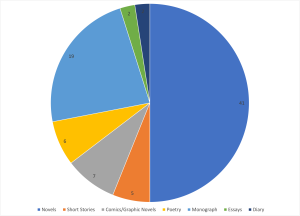A short list this week, and mostly music. But I’m starting with short essay that I actually heard (in an edited version) on the radio a few years ago:
Essay: “Things We Think We Know” by Chuck Klosterman
When I heard this originally, I was struck first and foremost by the idea that Europeans might have as distorted a picture of America as America has of the rest of the world. That is an unremarkable statement when put that way, but I think part of the American misunderstanding of Europe is that it is ore sophisticated and cosmopolitan than the US, and so less prone to such stereotyping. But Klosterman visits a German museum exhibition which suggests that Americans are the way we are because we are obsessed with cowboys and the romantic idea of the cowboy. This, as he points out, is absurd; cowboys have not been a prominent part of the American cultural imagination since the 1950s, probably. They remain part of our vocabulary, an image we can readily call upon to convey certain ideas compactly, but that is not the same thing.
I thought about this essay now, several years after hearing it for the first time, because we went to see Adam Gopnik give a talk at the Art Institute of Chicago about Picasso in America. The thing is, Picasso—almost uniquely among modern artists— never came to America. But Gopnik suggested that America still played a significant role in his work, in that certain images of America— the skyscrapers of New York, the open spaces of the midwest, Lincoln, capitalism, the Wright brothers— figured repeatedly and continually. Of course, this is only a version of America, and not necessarily one that American would recognize themselves in. At the same time, Picasso became, for Americans, an emblem of a certain kind of sophisticated, bohemian, European artistic type, which was no less distorted. Gopnik described a dynamic of mutual misunderstanding and exoticization that shaped Picasso’s relations with America, and vice versa.
Klosterman’s larger argument is that we tend to form stereotypes about things we don’t care about very much— by which I think he means, really, that we form them about things that we don’t pay much attention to, or attend to only sporadically, because if we were really consistently paying attention would would eventually come to realize (hopefully) that the reality is more complicated.
A sardonic German teenager told me what she thought the phrase “the American dream” meant: “I assume it means watching Baywatch twenty-four hours a day.” She was (sort of ) joking, but I’ve heard similar sentiments in every foreign country I’ve visited. There is widespread belief that Americans spend most of their lives watching Baywatch and MTV. But what’s interesting about this girl’s insight was her reasoning: She thinks Americans love Baywatch because Joey Tribbiani on Friends loved Baywatch. And this does not mean she viewed Friends as an accurate reflection of life, nor does it suggest that she saw Matt LeBlanc as a tragic spokesman for the American working class; this was just one random detail she remembered about an American TV show she barely watched. She didn’t care about this detail, and neither do we.
I don’t know if that argument would withstand rigorous analysis, but it’s an interesting way to think about it, and the piece is pretty funny.
Song: “Roseland” by RocketNumberNine and Four Tet
Yet another new Four Tet release, this time a co-production with RocketNumberNine (which is actually two people). It’s a nice long builder of a track, fairly low-key throughout but atmospheric and enveloping. (via)
Song: “The Race” by MGUN
I know nothing whatsoever about who or what MGUN is, but this track wants to break your door down and take all your stuff. You will need headphones or decent speakers.
Album: “Amok” by Atoms for Peace
This is “Thom Yorke’s other band,” which of course does them a huge disservice but is also inevitable. The project, which includes Flea from the Red Hot Chili Peppers and Nigel Godrich, who produced many of Radiohead’s records, began out of attempts to realize Yorke’s solo album Eraser in a live setting, and it sounds like it. If you like Radiohead’s last few records, you will certainly like this; if you don’t like those, you still might like this, as it is a bit more organic and less tightly-controlled.


